What role have Christians played in the #BlackLivesMatter movement in St. Louis, and what lessons have they learned? This panel discussion at the Urbana Missions Conference brought together black and white faith leaders to reflect on these movements and gave an opportunity to a packed theater of attendees to ask questions.
From Dec 27 – Jan 1, volunteers with our network of early career Christian academics are liveblogging seminars at the Urbana conference, a mission-focused student gathering of 16,000 Christians from across North America and the world. This post was co-written by Nina Thomas and Galina Pylypiv. Photos are by Galina.
Michelle Higgins is the director of worship and outreach at South City Church. She is a St. Louis native and is actively engaged in the #BlackLivesMatter movement through participation in civil disobedience, leadership development, logistics, and administrative support in both sacred and secular spaces. Michelle holds an MDiv at Covenant Theological Seminary. She is a proud supporter of local activism groups MCU (Metropolitan Congregations United), MORE (Missourians Organizing for Reform and Empowerment) and OBS (the Organization for Black Struggle), through which she has learned a great deal about collaboration and solidarity. Michelle is also the director of Faith for Justice, a Christian advocacy group and serves as an organizer for the Leadership Development Resource Weekend (LDR Weekend), an annual gathering founded to address the core concerns of dignity, identity, and significance for people of color.
Howie Meloch, who has lived in St. Louis since 1997, is the InterVarsity Associate Regional Director in the Central Region. He is also a co-founder of Faith for Justice.
Karen Anderson, a Webster Interdenominational Theological Center graduate, lives in St. Louis, Missouri and is a pastor at The Interdenominational Theological Center.
Mike Higgins has pastored South City Church since 2012. He attended Covenant Seminary and earned his MDiv in 1996. He served as PCA pastor in Chattanooga, Tennessee and Atlanta, Georgia. He was also an army chaplain (COL) assigned to the Pentagon. In 2012, he earned his DMin from Covenant Seminary with a focus on “Experience of African American Church Planters in the PCA,” and he’s now the dean of students there.
Michelle opens the session by encouraging the audience to sit near each other because we’re family. She shares where we’ve been and where we’re going. #BlackLivesMatter didn’t start in Ferguson, MO but have provided lessons that have a deep impact because they happen on our soil. Events of this nature help to break indifference and non-activism. Michelle invites the audience to learn lessons from these events before they become a reality in our cities.
Michelle warns audience of graphic photos in powerpoint as she begins to share them. She paints a picture of Michael Brown’s shooting. August 9, 2014 11:00am was “an ordinary Saturday morning when a choir rehearsal is happening, Christians are praying together, all of the normal things that happen on a Saturday morning’ and Michael Brown’s body is lying exposed and dead. This is a tragedy. An obscenity. No matter what he did or did not do, he was not deserving of sentencing and execution on a public street. “
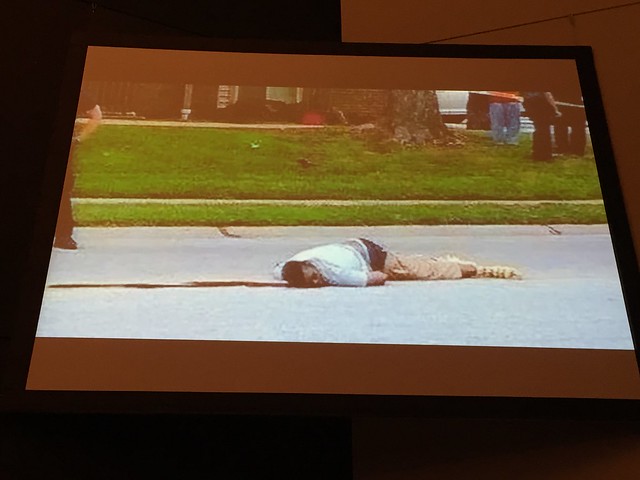 “When someone mourns, it gives us the opportunity to comfort them.”
“When someone mourns, it gives us the opportunity to comfort them.” 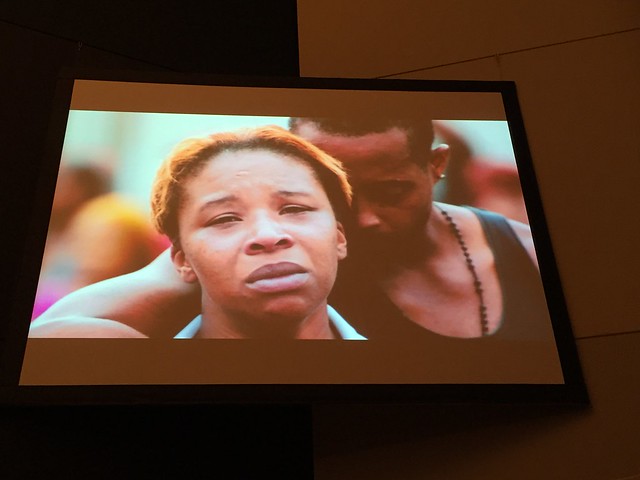
Violence is not only the destruction of property, but it is when the people who are paid to protect you mistreat you. It is when a man who could have let another man walk unbothered down the street decided to kill him instead. Violence is occupation, says Michelle.
Michelle observes “We are right now in the civil rights movement, so what must be do? Rise up.” She then shares pictures of women of color on a screen above the audience, explaining that these women were the first on the streets. She points the audience back to the bible and reminds them of God’s view on unfair deaths.
Community Anger
Michelle shares about how hip hop and poetry have been used to express rage, and talks about being “angry people” as a Christian stance. God uses rage to bring about justice which will bring about peace, she says.
Non-Indictment Night
“This death was tragic, this death was horrible, but this death was not a crime” said many people, including the grand jury. Those who express this view, says Michelle, simply showcase the injustice of how many people currently view black lives. Michelle explains how “we” protested the unfair deaths of black people. She encourages the audience to amplify the stories and people of faith involved in protests; protesting is necessary until the situation is “shut down”.
Michelle shows scenes of protesters are shown on the screen, people who are protesting because they have had enough and desire a response from the system. Michelle returns to the screen and shares how mainstream media does not share the whole story but there is “the ministry of proximity”. People need to go where the trouble is, she says, just as Christ came near the trouble begins, saying “that is where our lessons begin”. 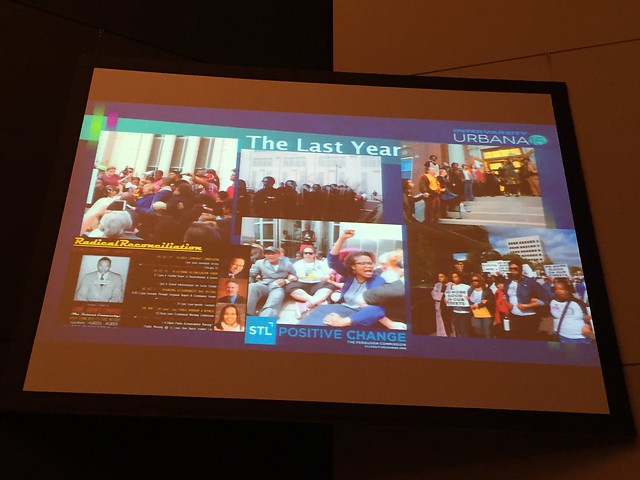
Panelist Talks
Howie Meloch, the first panelist, comes and sits in front of the audience. Howie shares how he felt called to work with InterVarsity and felt God calling, “if you follow me unto InterVarsity staff I will use you”. On August 9, 2015 a young man was killed in Howie’s own city and he knew nothing about it. He feels as though he missed the opportunity to speak because he was disconnected from his own community. Howie expresses the shame he felt in not advocating for the value of black life. Because of his lack of presence on social media, he felt like he was behind on hearing news about what was happening.
Howie later got in his car and attended a rally to “get present” and “lean in”. A group of young people and him walked in the middle of street in Ferguson. The story started with a young man in the middle of the street. Building on his background in ministry, he drove through Ferguson and prayed. He eventually came upon a Target parking lot with 200 police cars lining the parking lot. Howie sympathized with the thoughts he imagined of a young man seeing a body being dragged away As a white man with French Canadian roots, Howie explained, “I needed to be present in that space.”
“The church wants to lead this conversation but we are behind,” he notes. Most of churches in this United States dropped the conversation while they were building their own wealth and own dynasty. “The church comes now and wants to lead, you have no right, I have no right.” Howie explains how he felt as though he needed to remain silent because he didn’t understand the experience of racism.
How can Christians unused to conversations about race and injustice get started? Howie encourages them to be present, express humility, and persist through hard experiences and inner dissonance.
While listening and being present, Howie felt a great dissonance internally. He decided to pray but wasn’t sure how to pray. Many Christians make the mistake that when we experience that dissonance we say that God must not want me here. Howie finally prayed for God to wash over the city. He concludes by saying, “You must press through dissonance to meet Jesus in that space.
Mike opens by quipping: “I figure if I’m going to get shot at, I might as well get paid for it.” He was in the army for 30 years and believes God used that time to prepare him for his later work. When he protested, the federal marshals came out, and then the St Louis Police department. “We wanted to created a crisis’ We are U.S citizens” he reminds the audience.
When he was arrested in the Ferguson protests (read his story), the Marshals removed his clothing and saw his dog tags. They asked him, “Sir, what are you doing down here?” to which he answered, “I served this country for 30 years, there’s not a bigger patriot here but I think we can do better.”
While under arrest, a young man Pakistan sitting next to him was asked his race; he didn’t know how to answer. Mike believes the question was dumb, “there is only one race, the human race.”
At the seminary and in his church, Mike’s job is to create space to help young people process race in a safe place. He shares how he mostly works with young white folks who need a space to ask questions that may be stupid. When most of theology was written, race was not an issues, he says. Because of this, theology is difficult to now align with race now.
The next speaker, Karen Anderson, describes herself as a baby boomer who has a 31 year old son as well as a grandson: “my entry into this is them, their lives matter”. She worries about the world she is leaving behind for her family. Her son has hanging pants but a near perfect SAT score. He was an honors student but has still been racially profiled, “it’s personal” she asserts.
Karen was in an airport when she learned what happened in Ferguson, her church was less than 10 minutes away from what was happening. “The church is behind” she argues. Soon after, her church held a prayer meeting “because that’s what we know how to do.” After four prayers, the church set out into the street but then panicked. “Christians, clergy, faith based didn’t have sense enough to stand in the street with our children,” Karen says with regret.
As the movement grew, her church asked, “Where do we fit in?” because not everyone belongs in the street. “I’m old I can’t” she jokes. Karen explains how it’s important to understand where she fit as a older person in this movement, “Would I have had the courage to sit in a lunch counter?… They forced me to answer that question.”
Not all black churches got on board with the movement but Karen reminds the audience of God’s role in the issue to “set the captives free”. Karen suggests that churches “find out where the need is.” From her background in nursing, she knew there would be trauma. Anderson’s church began to form teams and went to neighborhoods to create a presence. “We did the Facebook thing” and asked people from the church to give an hour of their time.
As the protests continued, Karen called for supplies in “ghost towns’ where markets were shut down so mothers could get diapers and formula for their children. The church created a place “wherever you see a space’ you need to find a space.” The clergy women asked themselves which voices might not be heard and thought of mothers. Karen quotes Jeremiah 31:16. “A voice is heard in Ramah, mourning and great weeping, Rachel weeping for her children and refusing to be comforted, because they are no more.”
The women came together and cried. “My son was killed on this day and no one said sorry to them,” one mother shared. Anderson reminds the audience, “if you love me, take care of my sheep. He didn’t say judge the sheep. Really the politics are only to divide us further.” The nation has said that that black lives do not matter and because of this the call needs to go out, says Karen. “You can’t say all lives matter… until they matter you can’t say all lives matter.”
Karen concludes by saying that on the anniversary of Mike Brown’s death they held a luncheon for women who lost their children from violence and calling the audience to “Find your space — don’t sit back and say there’s not a space for you.”
Questions And Answers
How do you reckon with the fatigue and anger that come as a student in these times as a person of faith in a holy way?
“You need a circle of sisters you can share that with because the fatigue is real’” Pastor Karen Anderson begins to say, “it may be a counselor”. Anderson has a circle of women she turns to who are from different faiths who share how they feel in a holy way. She prayed for God to bring the people she would need, “Find you a circle.”
How can we as college students start constructive conversations about race, a socially deconstructive sin?
Howie Meloch points the person who asked the question to a woman in the audience who could answer his question. “You need to identify on your campus what needs to be renewed.” sharing how students need to use their relationships with the faculty. “For a lot of our campuses we need access.” continuing to say, “shouldn’t we care about who from our campus does not have access.” Meloch confesses how his alma mater does not cater to minorities as much as it could.
What is your view regarding the Black Lives Matter also affirming queer rights?
Michelle says that queers affirms a kernel of truth, “I am blessed by bearing God’s image.” but there are other things that are not as essential, “our entire culture is addicted to sexual gratification”, when we hear a person’s sexual orientation people often judge. “I believe God is for people who are not heterosexuals, I believe Jesus would affirm the phrase, ‘righteousnesses does not equal straightness’.” Instead the movement still boasts kernels of truth and believers should boast this. “Are we World War II Germany, are we them? If not, we should stand up for our gay brothers and sisters.”
Mike agrees with Michelle, “We need to ask questions that will not distract ourselves in one area because it does not align in another area.”
Nina Thomas is a Hunter college gradstudent studying special education. An avid blogger and video blogger, Nina is part of the ESN liveblogging team for Urbana 2015.

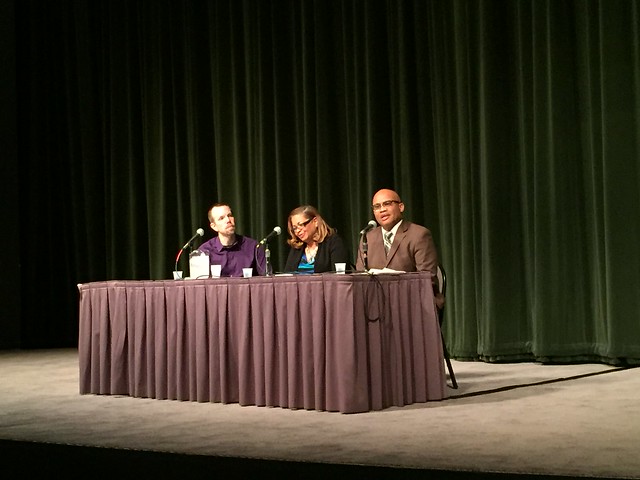
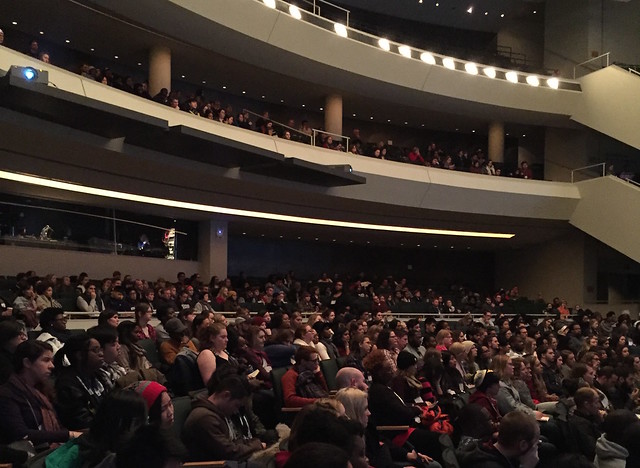
Leave a Reply